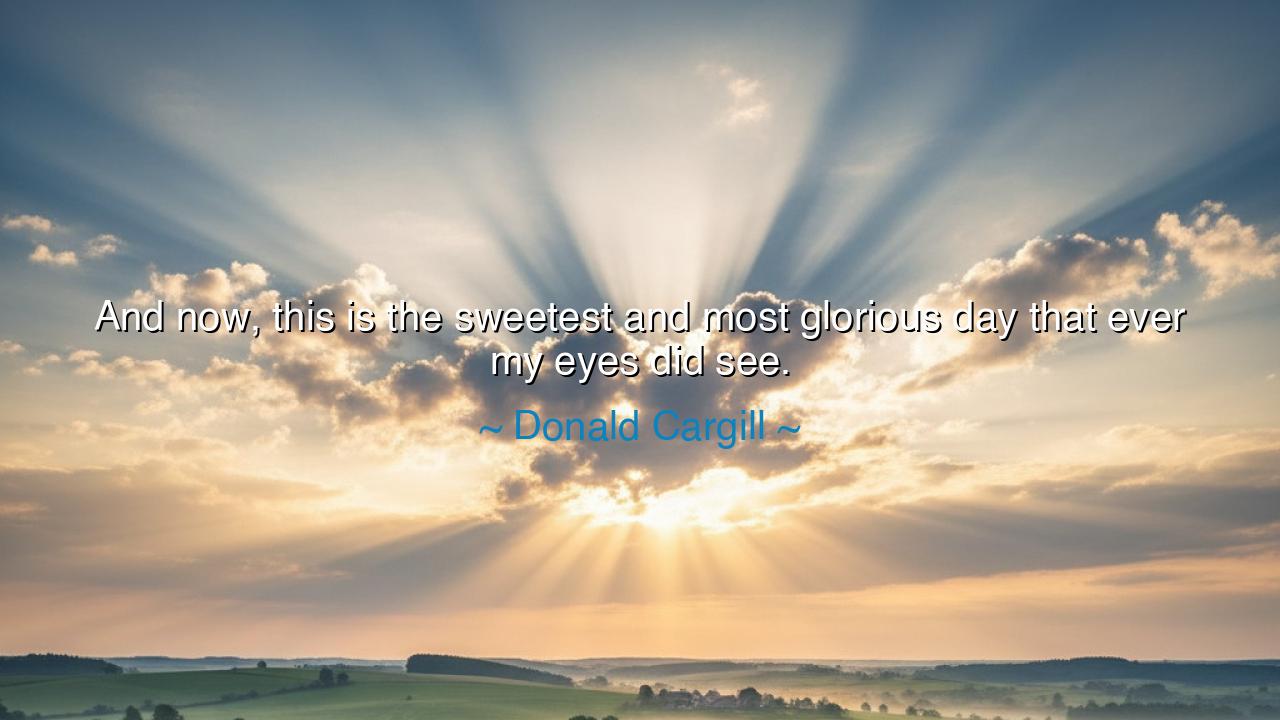
And now, this is the sweetest and most glorious day that ever my






“And now, this is the sweetest and most glorious day that ever my eyes did see.”
So spoke Donald Cargill, the steadfast martyr of Scotland, as he stood upon the scaffold in the year of our Lord 1681. These words were not born of comfort, nor spoken in the hour of triumph as the world counts victory. They were uttered by a man whose mortal end was near, whose body was condemned but whose soul stood free before the throne of eternity. To him, the day of death was not a terror but a crown, not a sundering but a union, not the end of life but its fulfillment. His eyes, though beholding the gallows, saw beyond the veil — they gazed upon the glory of the promise he had served all his days.
In those times, Scotland groaned beneath the yoke of oppression. The faithful Covenanters, of whom Cargill was one, refused to bend the knee to earthly powers that sought to govern the conscience. They stood for freedom of worship, for the right of the soul to bow to none but God. For this defiance, many were hunted, exiled, and slain. Yet Cargill, in his final hour, declared his joy — “the sweetest and most glorious day” — as if the gallows were not an instrument of shame but a gateway to eternity. His words transfigured death into triumph, pain into peace, and suffering into the highest song of liberty.
Behold, then, the deep meaning of his utterance. It is the voice of one who has conquered fear — not by sword or shield, but by faith. The sweetness he speaks of is not the sweetness of pleasure, but of completion. It is the stillness that follows the storm, the serenity that comes when the struggle is ended and the spirit stands in truth, unbroken. In that moment, Cargill tasted what all great souls seek: the peace that surpasses understanding. For he had remained true to his convictions even unto death, and thus his last breath was more radiant than a thousand dawns.
So too have others in the ages since shared in that same spirit. Think of Joan of Arc, who, bound to the stake, looked heavenward and cried the name of her Lord as flames rose around her. Or Socrates, who drank the hemlock with calmness, proclaiming that no evil can befall a good man, in life or after death. Each of them, in their final hour, found that strange and glorious sweetness — the moment when truth becomes dearer than breath, and the soul, released from fear, ascends to light. Their courage was not forged in ease, but in trial. And by their steadfastness, they became eternal witnesses to the power of conviction.
The lesson, then, is this: to live so that the final day shall be the sweetest. Let every heart labor not merely for comfort, nor for praise, but for truth — that pure and shining thing which no tyrant can extinguish. For when one has lived faithfully, death itself becomes but a door opening upon joy. The “glorious day” is not found in victory over others, but in victory over the self: over fear, over falsehood, over despair. It is the day when the soul stands naked and unashamed before its Creator, knowing it has kept the faith.
Take heed, then, you who read these words. Let your life be a preparation for such a day. Stand firm in your beliefs, even when the winds of the world howl against you. Speak with honesty, act with courage, love with fullness. And when darkness threatens, remember Donald Cargill’s cry — that what seems to the world a moment of loss may be to the faithful the sweetest and most glorious dawn.
For every generation must find its own scaffold — not of wood, perhaps, but of decision, of trial, of truth tested in the fire. The question is ever the same: will you stand, or will you yield? If you would taste the sweetness Cargill knew, live as one who already walks in the light beyond fear. Then, when your own last day comes, it shall not be a terror, but a triumph — the crowning of all your striving, the day your eyes truly see.






AAdministratorAdministrator
Welcome, honored guests. Please leave a comment, we will respond soon